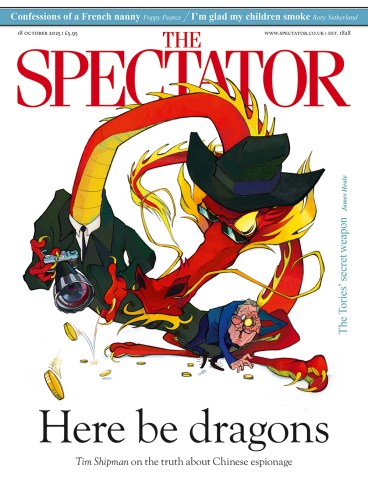
On 3 July a Chinese man, Xu Zewei, was arrested in Milan to face extradition on nine charges relating to the hack carried out by a group called Haf-nium during the Covid pandemic. Western companies had secrets stolen in 2020 and 2021 when a weakness in the Microsoft Exchange servers was exploited. The National Cyber Security Centre (NCSC), part of GCHQ, later said 70 British firms had fallen victim to ‘a malicious act by Chinese state-backed actors’. The court documents claim that officers of China’s ‘Ministry of State Security and the Shanghai State Security Bureau directed Xu to conduct this hacking’.
China is constantly probing for ‘weaknesses’ in British defences that could paralyse parts of the economy
On 30 May, a British man called John Miller, 63, was charged alongside a Chinese citizen, Cui Guanghai, with having ‘plotted to harass and interfere with an individual who criticised the actions of the People’s Republic of China’ and of having ‘conspired to traffick sensitive military technology to the Chinese regime’. The technology included ‘missiles, air defence radar, drones and cryptographic devices’.
You won’t have heard about either of these cases because they were brought by the US Department of Justice rather than by the Crown Prosecution Service (CPS) here. In the past three years more than 150 people have been convicted, jailed or indicted as Chinese spies in the US.
The contrast with the collapse of the case against Chris Cash and Christopher Berry, who were accused of spying on MPs for China, is stark. (Both firmly deny the charges.) The CPS announced it was dropping the case last month and has initiated a bitter blame game with the government. It raised questions about the role of the national security adviser Jonathan Powell and the judgment of Keir Starmer.
Perhaps more seriously, the affair reveals a Whitehall tendency to cover up the gory details of foreign spying in the UK. Four highly credible sources in the upper echelons of the last government, both political figures and officials, have revealed that far worse scandals have been hushed up. One said: ‘There were two very serious cases, one involving China and one Russia, which were swept under the carpet. There was a serious loss of technical data.’ The case involving Russia was suppressed, the source claimed, to avoid embarrassing a former prime minister.
A second source revealed: ‘They hacked the Ministry of Defence and Downing Street,’ and a third source corroborated this, saying: ‘The levels of penetration and activity is way more than has been disclosed publicly.’ Asked specifically whether the MoD and No. 10 were hacked, the third source said: ‘All of that is very well informed.’
The most catastrophic breach came when the Chinese purchased a company that controlled a data hub used by Whitehall departments to exchange information (including on highly classified projects), enabling Beijing to steal a goldmine of secret information. A fourth source said: ‘Extremely sensitive data was transferred between the most sensitive parts of Whitehall through it.’
The first source calls the episode ‘a stratospheric fuck-up’. The breach was so serious that Boris Johnson commissioned a report from Mark Sedwill, who doubled as cabinet secretary and national security adviser, and the intelligence services ‘on how it could have happened’.
This is what Dominic Cummings, Johnson’s former aide, was referring to when he wrote this week: ‘I watched [Johnson] and [Rishi] Sunak both mouth “what the fuck” and stare around in open-mouthed amazement in 2020 when the cabinet secretary explained a truly amazing penetration of critical infrastructure.’ Cummings said the incident was ‘classified to the max’ and that no one was fired. He told a podcast hosted by Dwarkesh Patel it was like a ‘nightmare picture’ from a ‘sci-fi novel’ which ‘is actually the reality’. He added: ‘The specifics of it are illegal to discuss.’
China, the third security source said, is a ‘kleptomaniac about information’, constantly probing for ‘weaknesses’ in British defences that could in future paralyse parts of the economy. ‘On the cyber side, we know they’re definitely trying to pre-deploy so that they can shut down systems when the day comes – turn the lights off or whatever.’
None of this should come as a surprise, since it has previously been reported that China hacked the Foreign Office through an outdated computer system, while both Liz Truss and Johnson were warned, when prime minister, that their phones were being targeted by rogue states. A recent leak of messages from Johnson’s office was attributed to the Russians, as was an arson attack on Starmer’s constituency home.
This makes the abandonment of the Cash case all the stranger. The CPS said it could not continue the prosecution because between 2021 and 2023 – when Cash and Berry are accused of passing information to Beijing – the legislation in force was the 1911 Official Secrets Act, which meant it needed to prove that China was an ‘enemy’ of Britain. They claimed the government failed to provide the necessary evidence.
Security minister Dan Jarvis told parliament on Monday that Matthew Collins, the deputy national security adviser, was in sole charge of supplying the evidence, denying that his boss, Jonathan Powell, played any role in doing so. Realising it looked like they were throwing Collins under the bus, Starmer praised him to cabinet on Tuesday.
To muddy the waters further, friends of Collins say he did provide evidence which would have been sufficient and he ‘doesn’t understand’ why the case was dropped. ‘He provided all of these evidence statements. He was told by the CPS that this was exactly what they needed, and then at the last minute they said they were not pursuing the prosecution.’ This individual added: ‘The guilty men and women are in fact in the CPS. They’re the ones who’ve dropped the ball.’
In truth, both No. 10 and the CPS are at fault. The judgement in the recent Bulgarian spying case showed that there was no need to prove China an enemy, only to convince a jury China was a threat – so the CPS could have pressed on. Sources close to the PM insist Collins couldn’t contradict the Tory policy towards Beijing at the time, which designated it a strategic competitor rather than an enemy. But Labour could equally well have chosen the legion of quotes from the strategic defence and security review, from Tory ministers and intelligence chiefs, that China was a ‘threat’. They chose not to.
The root of the problem is the lack of public candour from ministers about the economic and security trade-offs of dealing with Beijing at a time when the Treasury is desperate for foreign investment to boost growth. Oliver Robbins, the permanent secretary at the Foreign Office (who coincidentally was in China this week), told one sinologist that the policy was to ‘talk more internally about China and talk much less externally’ – in other words, to keep the details from the public.
Reports that Powell and Robbins held a meeting to discuss a warming of relations with China shortly before the CPS decision are true. Indeed Powell’s influence over China policy is such that even Robbins’s nose is ‘out of joint’, according to insiders. Some speculate that the government is trying to drum up business deals for a trip Starmer is expected to make to China next year.
China is also trying to build a new embassy on the site of the Royal Mint in London, under which there are sensitive data cables which serve the financial markets. After planning approval was rejected, President Xi Jinping raised the issue with Starmer in their first phone call in August last year and Angela Rayner, then the housing secretary, who called in the decision.
The heads of MI5, MI6 and GCHQ are all ‘pissed off’ that the case has been abandoned
Starmer later boasted about that to Xi at a summit, which is close to constituting a breach of the rules around the quasi-judicial role of ministers in planning cases. The ruling on the embassy, from Rayner’s successor Steve Reed, could come as soon as Tuesday. A former minister said: ‘It was always made clear by the Foreign Office and the Treasury that it would be very helpful to give the go-ahead.’ In Whitehall, there are fears that Powell (dubbed ‘the real Foreign Secretary’) will walk. A friend said: ‘Frankly, he doesn’t need this shit at his age.’ He has helped to keep the US on board with Ukraine, and aspects of the Trump peace deal between Israel and Hamas mirrored the sequencing and language of the Good Friday Agreement in Northern Ireland, of which Powell was the architect. A source close to Starmer said: ‘Jonathan is one of the supreme public servants of his generation. The PM is furious about people briefing against Jonathan.’
But Starmer’s problems go beyond Powell. The heads of MI5, MI6 and GCHQ are all ‘pissed off’ that the case has been abandoned. Just last week, the NCSC revealed that the number of ‘highly significant’ cyber-attacks (those impacting the government, essential services, large chunks of the population or the economy) has risen from 12 to 18 in the past year. Sir Ken McCallum, the director-general of MI5, is due to give his annual lecture soon. ‘He won’t hold back on the threat that China poses,’ a senior figure said.
The Americans are also incredulous. When a British MP discussed the case with a senior figure in the Trump administration, his response was: ‘What the fuck is going on?’ Reports that the US might cut off intelligence sharing over the case are hyperbole. ‘That’s bullshit,’ one official said. But there is a history of tensions over Britain’s stance. ‘Three, four years ago, the Americans and the Australians thought we weren’t taking China seriously enough,’ said one senior figure in the deep state. ‘Then we published the integrated review in 2021, which talked about the Indo-Pacific tilt. We increased our intelligence collection, and they said: “OK, you guys have finally got it.”’
However, suspicion remains in Washington D.C. Members of the US House of Representatives select committee on the Chinese Communist party are writing to the British embassy in D.C. to complain about the dropping of the case and demand to know what information Cash and Berry might have passed to Beijing about American China hawks – details of which would have emerged had the court case gone ahead.
So what next? Starmer preempted a new assault from Kemi Badenoch at PMQs by announcing that he would publish the witness statements provided by Collins, but pointed out that the first was filed under the Tories. MPs have written to the CPS demanding that they reopen the case. Parliament’s Intelligence and Security Committee, chaired by former defence minister Kevan Jones (now Lord Beamish), is set to launch an inquiry which could demand testimony from Powell. The ISC will meet on Thursday afternoon. Beamish said: ‘We expect to receive material on this as part of our regular reporting from the agencies. The committee will then decide what course of action to take.’
Lindsay Hoyle, the Speaker, has told MPs he wants to pursue a private prosecution. It is understood he consulted Lord Hermer, the attorney-general, before the party conferences. Hoyle told allies Hermer gave him only ‘tea and comfort, but nothing positive’. He is now consulting other lawyers.
Whatever follows, the entire episode has been a farcical reenactment of that old Watergate adage that in government, it’s not the crime which kills you but the cover-up.
Who is really to blame over the collapse of the China spy case? Tim joins the Edition podcast to discuss further:










Comments